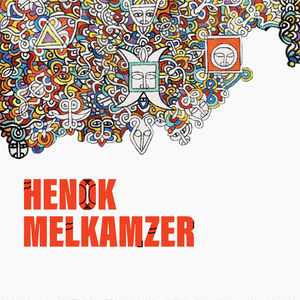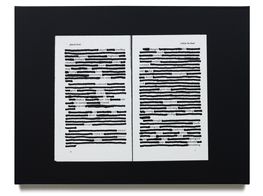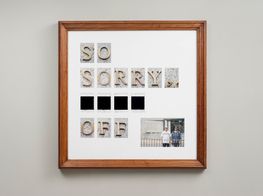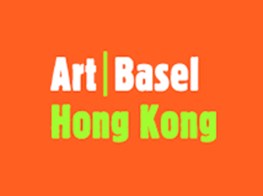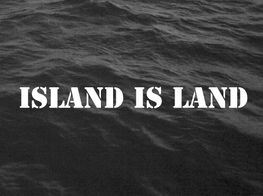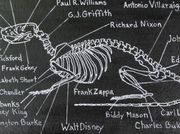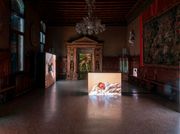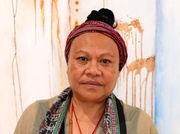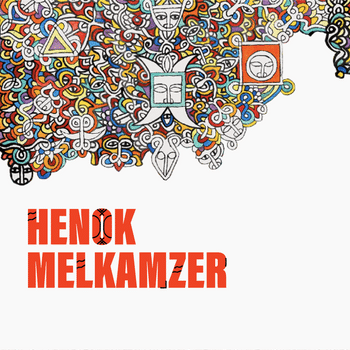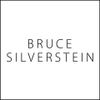Moderation(S): A Fictional Residency At Spring Workshop
In an art world dominated by monument-sized sculpture and room- encompassing installations, it's refreshing to be reminded of a seminal work the size of a matchbox.
In 1975, Marcel Broodthaers produced a work that measured 38mm x 25mm titled The Conquest of Space. Atlas for the Use of Artists and the Military. The work is an atlas insofar as it can be described as a book, each page of which depicts the black silhouette of a country. There are 32 different countries in total in the book, and they are ordered alphabetically. Rather than representing each country to scale, Broodthaers has depicted them all with the same dimensions so that Luxembourg is the same size as the United States.
Placed in island-type isolation on each page and without the usual signifiers and signs of mapping—such as blue lines to indicate rivers or triangular peaks to signify mountains—there is no means of understanding the geographical relation of one country to any other. By disrupting the conventions of mapmaking the artist has triggered a consideration of classifications that govern our understanding of the world, and a recognition that categories are not autonomous.
Artist Heman Chong describes A Fictional Residency as a platform from which to explore how fiction governs our understanding of the world.
Oscar van den Boogaard, writer in residence at Spring Workshop, used Broodthaers's work as a prompt for the project, A Fictional Residency. This project is part of the ongoing Moderation(s) program, a long-term undertaking encompassing multiple projects and initiated by the Witte de With Center for Contemporary Art (Rotterdam) and Spring Workshop (Hong Kong).
Singaporean artist and writer Heman Chong acts as moderator while writer Christina Li acts as witness, blogging her observations as the project unfolds. For A Fictional Residency Chong invited van den Boogaard to work with visual artist Nadim Abbas, writer-director Enoch Cheng, writer-journalist Doretta Lau as well as artist-architect duo Valérie Portefaix and Laurent Gutierrez of MAP Office. Eschewing the delineation between writer and visual artist, the participants worked to each produce a short story for inclusion in a volume that was written, published and launched within a week.
Chong describes A Fictional Residency as a platform from which to explore how fiction governs our understanding of the world. Against the backdrop of the clean, modern space of Spring Workshop, itself set against the grimy and noisy background of Wong Chuk Hang, the participants met each morning and worked on their stories until the early evening. The group stopped only for occasional breaks to read aloud their progress and receive encouragement, suggestions and criticism.
While each story is an individual work, the group acknowledges the sharing of the experience resulted in, as Chong referred to it, a 'cross infection' between the works. In the work by MAP Office, one notices the same liquidity that permeates van den Boogaard's story. Van den Boogaard places his protagonist in a swimming pool, MAP Office describes an Oriental rug with over dyed colour that becomes 'ubiquitous, like a woven swimming pool'. Talking to the authors about the writing experience they all acknowledge how the hardware of daily life slips into the imagination with each story representing an abstracted form of reality.
Just as fiction and non-fiction appear to collide in these stories, so do the disciplines of visual art and writing. Visual artists have participated in a literary endeavour, but equally the resulting volume operates as a type of exhibition or installation. The stories become objects and these objects are accessed not by looking at them, but by reading them. There is a type of tactility and materiality to the text. Nadim Abbas describes a scrawny cat's left eye as 'glazed over, the milky white colour of a waxen moon'; and Heman Chong evokes the scrawling character of Tsang Tsou Choi's graffiti calligraphy. If Broodthaers's art grew out of a refusal to grant structuralism its premise that each system is autonomous, then one of the outcomes of A Fictional Residency is to prove him correct. —[O]
The short stories are available to download free here.



